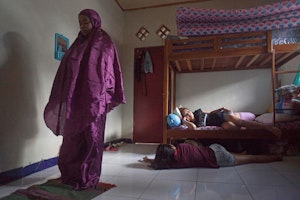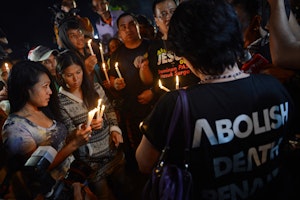Indonesia Executes Several for Drug Crimes in an Ominous Sign of a Trend
By Rick Lines

Today, Indonesia took several people convicted of drug offenses, lined them up before a firing squad, and shot them dead. They were the latest victims of the draconian drug policies implemented by President Jokowi, who resurrected capital punishment when he took office in 2014, and who had 14 people executed for drug crimes last year.
Indonesia’s turn towards the death penalty for drug offenses speaks to a disturbing trend that is perhaps most starkly illustrated by the country’s island neighbor to the north, the Philippines. In April, while speaking on a UN panel about drugs and capital punishment, I sat alongside the Philippines ambassador as she explained why her government had abolished the death penalty in 2006.
With her words still fresh in my mind, it was with profound sadness that I watched the ascension of Rodrigo Duterte to the Philippines presidency some weeks later. Duterte is a hard-line strongman who came to power on a platform that reinstates capital punishment and actively encourages police officers, and even private citizens, to go out and kill people involved in the drug trade.
President Duterte was inaugurated on June 30, and in his first month in office, we have witnessed what can only be described as state-sanctioned criminality on a mass scale. Reports detail up to 300 people murdered in the streets this month alone, a figure thought to be conservative as it reflects only those killed in police operations, and not those perpetrated by armed vigilante groups egged on by the president himself.
A local newspaper even maintains a regularly updated kill list, providing an ongoing, gruesome catalogue of the slaughter. Such open brutality in the name of “fighting drugs” has not been seen since 2003, when the government of Thailand murdered 2,000 alleged drug dealers in a three-month killing spree widely condemned by human rights organizations and UN bodies.
While the ongoing abuses in the Philippines and Indonesia are extreme, they are unfortunately not unique. Indeed, the body count in the global war on drugs keeps climbing week after week, year after year. Just this week, Iran Human Rights reported that at least 250 people were executed in that country in the first six months of 2016, half of them for drug offenses. Iran therefore maintains its place as one of the small group of nations—along with China, Saudi Arabia, Indonesia, Singapore, Malaysia, and Vietnam—that executes drug offenders in staggering numbers.
But the drug war body count extends beyond state-sponsored violence.
Two weeks ago in Mexico, 14 people were shot dead in feuding between rival drug cartels, adding to the more than 100,000 people killed in the country’s drug war since 2006. In late June, the United States Drug Enforcement Agency reported that fatal opioid overdoses have more than tripled since 2007—in some cities, overdose deaths are so common that there’s no room to store all the bodies.
And last week in Canada, 36 overdoses were recorded in a single British Columbia neighborhood over the course of one weekend. Deaths were fortunately averted in these cases because of access to the life-saving overdose medication naloxone. But not everyone is so fortunate—earlier this month, the B.C. coroner’s office reported that deaths from overdose in the province are up by 75 percent over last year.
I have written previously on the pernicious impacts of “punitive suppression”—the belief that harsher punishments for drugs will result in more effective suppression of drug use and drug markets. This logic underpins legal and drug policy frameworks in almost every country around the world, driving the criminalization, marginalization, and violence that make deaths from all the causes above (and more) sadly predictable.
Whether driven by brutal police and military crackdowns, battles between rival drug gangs, state-sanctioned executions, or health risks created or exacerbated by criminalization, stories such as these are the now predictable outcome of the global drug regime that prioritizes criminalization over health, violence over human rights, ideology over evidence.
President Duterte has justified his brutal crackdown by arguing that the Philippines is “drowning” in drugs. As more and more information emerges, it is clear that his country, and others, are also drowning in blood—blood that seems to stain the hands of every country the war on drugs touches.
Harm Reduction International is a grantee of the Open Society Foundations.
Rick Lines is the executive director of Harm Reduction International.


